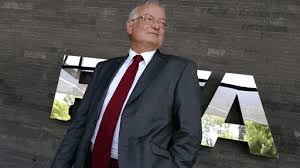By Andrew Warshaw
April 17 – Former FIFA ethics judge Hans-Joachim Eckert, removed three years ago by the FIFA Council led by Gianni Infantino, has added his voice to speculation over the motives of undocumented meetings between Infantino and Switzerland’s attorney general Michael Lauber.
Last month Lauber, who led the Swiss side of the FIFAgate probe, was sanctioned for disloyalty, lying and breaching his office’s code of conduct. And this week Switzerland’s federal court went a step further by preventing Lauber’s bid to rejoin investigations of corruption into FIFA.
Unofficial dealings between Lauber and Infantino, just as the latter was considering seeking the FIFA presidency, have led to questions that go right to the heart of the independence of the Swiss judiciary as well as to the integrity of FIFA.
Eckert and Cornel Borbely were sacked during a purge of senior governance watchdogs having chaired the adjudicatory and investigatory chambers of FIFA’s Ethics Committee, respectively.
Unconfirmed reports have claimed that Lauber and Rinaldo Arnold, a senior prosecutor and a personal friend of Infantino, met in July 2015 – eight months before Infantino landed the FIFA presidency – allegedly to find out if he was the target of any corruption probe as he prepared to launch his campaign to take over from Blatter.
Eckert told Switzerland’s respected publication Neue Zurcher Zeitung that informal dealings between Lauber and Infantino “and the resulting confusion about the circumstances were certainly not conducive to clarifying the facts.”
“I was a public prosecutor myself for many years, and I can only say one thing: there are guidelines that clearly state that a record of every meeting that is somehow related to professional activity must be filed and archived,” he told the paper.
The work of Borbely and Eckert brought down a string of key officials, not least Blatter, only for FIFA to decide not to renew their mandates. A Swiss criminal investigation into the infamous “disloyal payment” authorised by Blatter to then UEFA president and FIFA vice president Michel Platini in 2011 which led to long bans for both of them, remains ongoing.
Both men steadfastly maintain their innocence but Eckert continues to take a very different view.
“The case was well documented in FIFA’s files. We had Platini’s bill and we had the receipt of payment signed by Blatter,” he told the NZZ. “The only thing that had to be checked was whether there was a legal reason for this payment transaction of over two million francs. For security purposes, we consulted two legal opinions, which classified the process as unfaithful business management.”
Contact the writer of this story at moc.l1745329243labto1745329243ofdlr1745329243owedi1745329243sni@w1745329243ahsra1745329243w.wer1745329243dna1745329243

